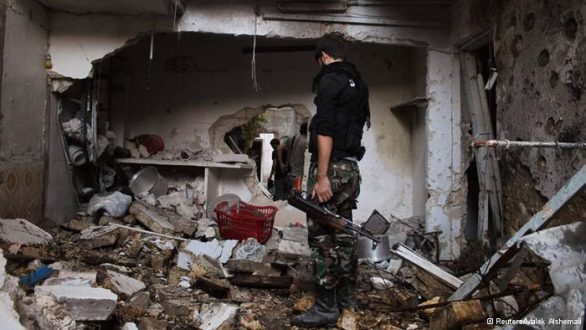Syria Islamist militants capture town near Turkey border
BEIRUT // Islamist militants captured a small town in northwestern Syria near the Turkish border as part of their offensive in the rugged coastal region that is a bastion of support for President Bashar Al Assad, activists said on Monday.
Topic
Fighters from an array of armed opposition groups seized the predominantly Armenian Christian town of Kassab on Sunday. The rebels, including militant from the Al Qaeda-affiliated Al Nusra Front, have also wrested control of a nearby border crossing to Turkey.
The advances, while minor in terms of territory, provided a boost to a beleaguered rebellion that has suffered a string of battlefield losses in recent weeks. Forces loyal to Mr Al Assad have captured several towns near Syria’s border with Lebanon as part of a government drive to sever rebel supply lines across the porous frontier.
Rebels launched their offensive on Friday in Latakia province, which is the ancestral home of Mr Al Assad’s family and a stronghold of his minority Alawite sect, the Shiite offshoot community that is a main pillar of support for his rule. Since then, the fighting has focused around Kassab and the nearby border crossing.
Rami Abdurrahman, the director of the Britain-based Syrian Observatory for Human Rights, said rebels were in control of the centre of Kassab on Monday, but clashes were raging in the hills outside of town.
Government warplanes were conducting air strikes on several positions in the area, including Nabeh Al Murr and the scattering of homes and fields surrounding Kassab, the Observatory said. There was no immediate word on casualties.
A Syrian state reporter speaking on TV from outside Kassab on Monday said the government had captured several Al Nusra fighters, and that the army is determined to take back the ground it has ceded. A pillar of white smoke could be seen rising above the green, forested hills behind the reporter.
In an amateur video posted online, two opposition fighters stand on a rooftop in Kassab and raise their arms in celebration. A checkpoint near the post office, replete with sandbags and oil drums painted like the Syrian flag, sits abandoned. The streets are deserted. The camera pans past the base of a smashed statue that the narrator says was of Mr Al Assad’s late father and Syria’s former leader, Hafez.
Damascus claims the rebels entered Syria from Turkey, and has accused Ankara of pursuing “aggressive policies” toward Syria. On Sunday, Turkey’s military said it shot down a Syrian MiG-23 after it entered Turkey’s airspace. Syria says the jet was flying over Syrian territory when it was hit.
Turkey, a Nato member, is one of the main backers of the 3-year-old rebellion against Mr Al Assad. Ankara allows rebels to use Turkish territory as a logistical and support base, and weapons and fighters move fairly freely across the border into opposition-held parts of northern Syria.
The continuing rebel offensive in Latakia is not the opposition’s first significant incursion in the province.
Last August, a mix of moderate and extremist rebel brigades captured around a dozen villages in the Latakia mountains, before a government counteroffensive expelled them.
Afterward, Human Rights Watch said nearly 200 civilians, including children, the elderly and the handicapped, were killed in the attack. It said rebel abuses during the operation amounted to war crimes.
Now in its fourth year, Syria’s conflict has killed more than 140,000 people, forced more than 2 million people to seek refuge abroad, and triggered a massive humanitarian crisis across the region.
The UN Security Council last month demanded immediate access everywhere in Syria to deliver humanitarian aid to millions of people in need. It also called for an end to sieges of populated areas, and a halt to all attacks against civilians, including indiscriminate shelling and aerial attacks using barrel bombs in populated areas.
In a report released Monday, Human Rights Watch said Mr Al Assad’s government has continued its sweeping aerial campaign against opposition-held areas of the divided city of Aleppo in defiance of the UN resolution.
“New satellite photos and witness accounts show the brutality unleashed on parts of Aleppo,” said Sarah Leah Whitson, Middle East director for the New York-based group. “Use of barrel bombs in residential neighbourhoods has done the expected: killed hundreds of civilians and driven thousands from their homes.”
Barrel bombs are makeshift devices packed with hundreds of kilograms of explosives as well as scraps of metal. Pushed out of the back of helicopters, the crude weapons cause massive damage on effect.
The right group’s report said it used satellite imagery to identify at least 340 places in rebel-controlled areas of Aleppo that were damaged between early November and February 20. The majority of the sites bore signatures of damage consistent with barrel bombs, it said.
Human Rights Watch also called on the Security Council to impose an arms embargo on Syria, including on the purchase or servicing of helicopters. It said such a measure would limit the government’s ability to carry out air strikes.



